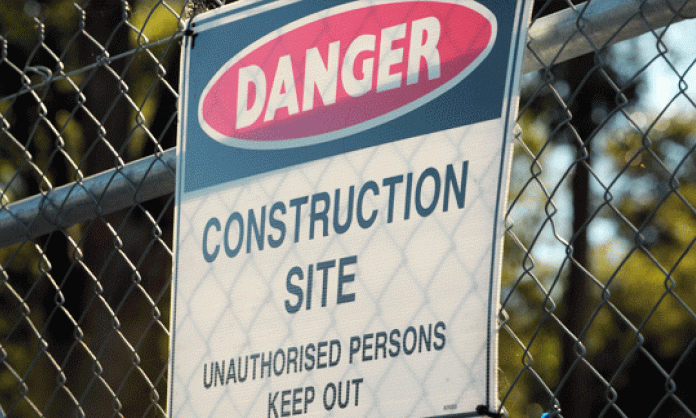Conan Doyle was 20 years old when he left Ireland for Australia. He had a working holiday visa and a few months of landscaping experience. In Brisbane, he met some other Irish men with jobs in construction. They helped him get one too. Two years later, he was back home “feeling broken and abused”.
Doyle was long gone by the time Tony Abbott rounded up his squad for a royal commission into trade unions. The whole circus would probably have passed him by if it weren’t for Eoin O’Neill.
O’Neill was Conan Doyle’s boss. He was also one of a long list of construction players who lined up at the royal commission for a turn slinging mud at the biggest union in the industry, the CFMEU. O’Neill said his company, Lis Con Construction, was the victim of a union campaign of “racism” and malicious harassment.
“Their [the CFMEU] officers went around to every job in Queensland and told companies not to use us because we didn’t pay super, we carried illegals”, O’Neill told the commission. The racism was “because we were Irish”, he clarified. The union “destroyed” Lis Con’s Queensland business, the newspapers reported. The tale of the little Irish battler “forced to shut up shop” by anti-immigrant union thuggery was the hot royal commission story for a few days.
That could have been the end of it. But there was another story, and, after watching O’Neill’s evidence on YouTube, Conan Doyle was angry enough to tell it. First, he emailed the commission to share what he knew about Lis Con. No one was interested.
Although never a union member during his time in Australia – “I knew that if I joined I would be sacked’ – Doyle also contacted the CFMEU. He told them everything and put it in a statement. Doyle’s is the real story of the grubby end of the construction industry – one where endemic illegality, exploitation and intimidation mire the working life of thousands. Yet, for all the inspectors, commissioners and informants crawling around the industry, no-one, except the union, ever gave a stuff.
Sham contracts
It is a common, though illegal, practice for bosses to avoid paying employee entitlements (leave, penalty rates, superannuation) by engaging unskilled labourers as “independent contractors”. In 2010 the CFMEU put the number of construction workers contracted on a sham basis at between 92,000 and 168,000. Since January 2013, Fair Work Building and Construction has initiated one prosecution for sham contracting.
Conan Doyle says: “When I started with Lis Con it was as an ABN worker. During my time working for Lis Con on an ABN I was paid by a number of different companies. I think this was because I was on a working holiday visa. My understanding is that it is a condition of the working holiday visa that you don’t work for a single employer for more than six months. I think Lis Con paid me through separate companies to get around this condition … a lot of Lis Con’s employees are young Irish men on working holiday visas and their pay was also moved from one company to another.”
457 visa
After about a year, Lis Con decided it wanted to keep Doyle on and sponsored him to stay on a skilled (subclass 457) visa. Doyle, who had no trade qualifications, says the manager put him on to a specific migration agent and directed him to make up a work history. “Do up your resume to say that you’ve got 4 years’ experience as a carpenter and get someone in Ireland to vouch for you.” Other workers were sent to the same agent: “Most of these guys told me that they also lied about their work history in Ireland”, his statement says.
Doyle says managers warned him off the union: “I’m Irish, we have to stick together. Don’t trust the unions. They want to kick you out of this country. If any Lis Con workers join the union – you will get the sack.”
Sometimes, Doyle recounts, company representatives were more direct in their coercion. He should be scared of his bosses, he was told, because they “were gangsters with connection to the IRA, the Lebanese mafia and the bikies”. Men whom he understood to be “heavies” for the company turned up at the workers’ accommodation to convey messages from the bosses. Other times, his visa was threatened if he wasn’t compliant with demands.
Wages and conditions
Doyle’s first job was in Melbourne: “He [a manager] asked me if I could get to Melbourne the following day. He said that Lis Con would have accommodation ready for me in Melbourne. The workers’ accommodation was a house in Carrum Downs … there were 3 men in one room, 2 in another room, 2 in another room, 2 people sleeping on the couch and 2 people sleeping on the floor ... the house only had one bathroom.”
Next Doyle was sent to Adelaide – for a week, he was told. He left most of his things in Melbourne. The accommodation there was the same – “we were crammed in” – with people sleeping on the floor.
“We started work at about 7:15 am and we worked at least 11 to 13 hour days – finishing at 6:15pm or as late as 8:15pm. On Saturdays we worked 7:15am to 3:30pm and we worked every second Sunday from about 7:15am to 1:30pm.”
“After working 7 days straight I was told that I would not be going back to Melbourne. After working 13 days in a row, of 11 to 13 hour days, I was told that I could have a day and a half off.”
After a few months in Adelaide, Doyle was carted off again. He could get a week’s or a day’s notice of a move. In just over two years, Doyle says, “Lis Con had moved me from Brisbane, to Melbourne, then to Adelaide, then back to Melbourne, then to Adelaide again, then to Newcastle, then back to Adelaide, then to Mt Isa and finally Narromine … in harsh conditions and constantly feeling intimidated.”
“I had worked six days a week and more often than not over 60 hours per week. I wasn’t paid for all the hours I worked.” Doyle recounts that he was a paid a flat hourly wage at Lis Con. He never received any of the penalty rates, travel and site allowances he was entitled to.
“I was afraid to speak up, afraid to speak my mind … because I thought that if I did I would be fired.” Doyle says he often talked to CFMEU officials while he worked at Lis Con. He didn’t join because he was afraid but said the union was “always willing to help as best they could and seemed to understand [his] predicament”.
The union says Doyle’s story matches complaints it regularly receives from workers too scared to speak out. The royal commission says Doyle’s story is “peripheral” to its enquiry.











